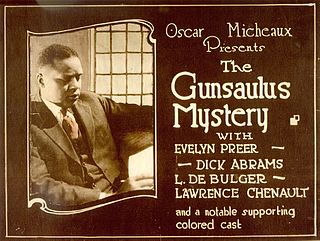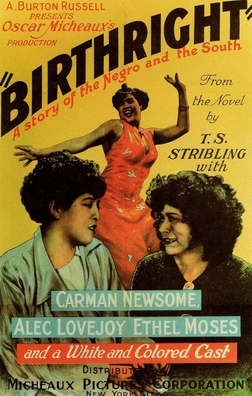Related Research Articles

Within Our Gates is a 1920 American silent race drama film produced, written and directed by Oscar Micheaux. The film portrays the contemporary racial situation in the United States during the early twentieth century, the years of Jim Crow, the revival of the Ku Klux Klan, the Great Migration of blacks to cities of the North and Midwest, and the emergence of the "New Negro".

Oscar Devereaux Micheaux (; was an American author, film director and independent producer of more than 44 films. Although the short-lived Lincoln Motion Picture Company was the first movie company owned and controlled by black filmmakers, Micheaux is regarded as the first major African-American feature filmmaker, a prominent producer of race films, and has been described as "the most successful African-American filmmaker of the first half of the 20th century". He produced both silent films and sound films.

Body and Soul is a 1925 race film produced, written, directed, and distributed by Oscar Micheaux and starring Paul Robeson in his motion picture debut. In 2019, the film was selected by the Library of Congress for inclusion in the National Film Registry for being "culturally, historically, or aesthetically significant".

The Homesteader (1919) is a lost black-and-white silent film by African-American author and filmmaker Oscar Micheaux. The film is based on his novel inspired by his experiences.
Gertrude Sanborn was an American journalist, short story writer, and novelist.

Lawrence Chenault was an American vaudeville performer and silent film actor. He appeared in approximately 24 films between years 1920 and 1934; most of his performances were in films directed by pioneering African-American filmmaker Oscar Micheaux. His brother, Jack Chenault, was also a film actor.

The Gunsaulus Mystery is a 1921 American silent race film directed, produced, and written by Oscar Micheaux. The film was inspired by events and figures in the 1913–1915 trial of Leo Frank for the murder of Mary Phagan. The film is now believed to be lost. Micheaux remade the film 1935 as Murder in Harlem.

A Daughter of the Congo is a 1930 race film directed, written and produced by Oscar Micheaux. The film is loosely based on the novel The American Cavalryman (1917), by African-American novelist and playwright Henry Francis Downing. It is considered a lost film.
Uncle Jasper's Will is a 1922 race film directed, produced and written by Oscar Micheaux. The film is a drama about the contents of a last will and testament left behind by an African-American sharecropper who was lynched after being falsely accused of the murder of a white plantation owner. The film was intended as a sequel to Micheaux’s landmark feature Within Our Gates (1920).
The House Behind the Cedars is a 1927 silent race film directed, written, produced and distributed by the noted director Oscar Micheaux. It was loosely adapted from the 1900 novel of the same name by African-American writer Charles W. Chesnutt, who explored issues of race, class and identity in the post-Civil War South. No print of the film is known to exist, and it is considered lost. Micheaux remade the film in 1932 under the title Veiled Aristocrats.

Veiled Aristocrats is a 1932 American Pre-Code race film written, directed, produced and distributed by Oscar Micheaux. The film deals with the theme of "passing" by mixed-race African Americans to avoid racial discrimination. It is a remake of The House Behind the Cedars (1927), based on a novel by the same name published in 1900 by Charles W. Chesnutt. Micheaux may have borrowed the new title from a 1923 novel by Gertrude Sanborn.
A Son of Satan is a 1924 silent race film directed, written, produced and distributed by Oscar Micheaux. The film follows the misadventures of a man who accepted a bet to spend a night in a haunted house. Micheaux shot the film in The Bronx, New York, and Roanoke, Virginia.

The Dungeon is a 1922 race film directed, written, produced and distributed by Oscar Micheaux, considered the African-American Cecil B. DeMille due to his prolific output of films during the silent era, one of his greatest works being Body and Soul (1924). The Dungeon was his first horror effort, an early blaxploitation take on the Bluebeard legend.
Deceit is a 1923 American silent black-and-white film. It is a conventional melodrama directed by Oscar Micheaux. Like many of Micheaux's films, Deceit casts clerics in a negative light. Although the film was shot in 1921, it was not released until 1923. It is not known whether the film currently survives, which suggests that it is a lost film.
The Symbol of the Unconquered is a 1920 silent "race film" drama produced, written and directed by Oscar Micheaux. It is Micheaux's fourth feature-length film and along with Within Our Gates is among his early surviving works. The Symbol of the Unconquered was made at Fort Lee, New Jersey, and released by Micheaux on November 29, 1920.
Birthright is a 1924 silent film by American director Oscar Micheaux. Produced in 10 reels, it is adapted from Thomas Sigismund Stribling's novel of the same title (1922). The film is now lost.

Birthright is a 1938 American drama film directed, co-produced and co-written by Oscar Micheaux and starring Carman Newsome. This is a talkie remake of Micheaux's 1924 silent film of the same name; both were adapted from white author T. S. Stribling's eponymous 1922 novel. Starring J. Homer Tutt, Micheaux's 1924 film was highly controversial for its graphic depiction of racism. The film is now considered lost.

African American cinema is loosely classified as films made by, for, or about Black Americans. Historically, African American films have been made with African-American casts and marketed to African-American audiences. The production team and director were sometimes also African American. More recently, Black films featuring multicultural casts aimed at multicultural audiences have also included American Blackness as an essential aspect of the storyline.
Harry Henderson was an actor in theater and films in the United States. He made four films with the Colored Players Film Corporation. He was also cast in several Oscar Micheaux films and had a starring role in the film melodrama The Scar of Shame. He portrays a wealthy concert pianist in the film. He also had a lead role in the 1926 film The Prince of His Race.
William Fountaine was a film actor in the United States. He starred in Oscar Micheaux's 1922 film Uncle Jasper's Will, The Dungeon released the same year, and Deceit in 1923. He had a leading role in the well received 1929 musical film Hallelujah. According to an account of experiences filming the movie, Fountaine protested at bigoted dialogue he was supposed to say stating he "wouldn't be able to return to Harlem" if he repeated the lines in the script.
References
- ↑ Peterson, Bernard L., Early Black American Playwrights and Dramatic Writers, Greenwood Press, 1990, p. 137.
- ↑ "Reclaiming the Frontier: Oscar Micheaux as Black Turnerian", African American Review, September 22, 2002.
- ↑ Moon, Spencer; Allen, Linda (1997). Reel Black Talk: A Sourcebook of 50 American Filmmakers. ISBN 9780313298301.
- ↑ The Virgin of Seminole at SilentEra.